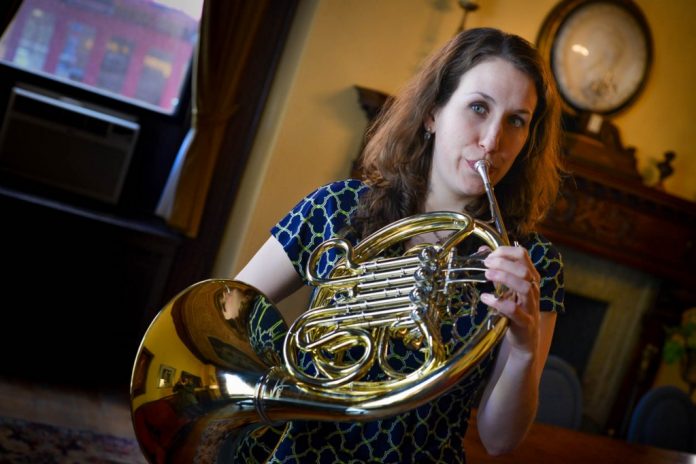Sweet sounds: Sarah Boxmeyer plays the French horn in her home. She is heading to Yale to get her master’s degree in music performance. MARIA POUCHNIKOVA / TIMES PHOTO
When Sarah Boxmeyer was 5, she saw a one-man band. One of the instruments he was playing was an accordion, and she was hooked.
“I made my parents sit with me for hours so I could watch him play,” she said.
By the time she was 6, she was taking accordion lessons and playing the “Beanie Baby Song,” which her teacher wrote especially for her.
Fast-forward through 18 years and a change in instrument. Boxmeyer now plays French horn, is graduating from the world-famous Curtis Institute of Music and is heading to Yale to get her master’s degree in music performance.
Boxmeyer, who grew up on Friendship Street in Mayfair, is the only Philadelphian in this year’s graduating class at Curtis.
Boxmeyer practices several hours daily — outside of her Curtis classes and rehearsals. Studying music, she said, “is every day.”
She’s been doing that for years, she said. Feeling the music, she said, is something newer.
“Things changed for me about two years ago,” she said. “I began to understand what musicality is — putting emotion into the music.”
You have to give yourself permission to feel music, she said.
“Romance,” by Camille Saint-Saens, a short piece that she played for her graduation recital, attracted her because it is “packed with emotion.”
Boxmeyer, who went to grade school at Holmesburg Baptist Christian School, didn’t take up the horn until she was in ninth grade at Girls High.
She refers to her instrument as a “horn,” not as a “French horn.” Besides, it’s not really French, she said. “It had its origins in Germany.”
It can be “a very scary instrument,” she said, but added she was enjoying herself about a year after she began.
Horn is not an instrument played often in popular music. It is, however, heard often in movie soundtracks, she said. The music that accompanies an entrance by Darth Vader in the Star Wars episodes, for example, is horn, she said. There is a lot of horn in the soundtrack of The Lord of the Rings, she said. Wolfgang Amadeus Mozart wrote many pieces for horn.
“He had a friend who was a butcher and a horn virtuoso,” she said. Mozart had a lot of fun writing pieces for his pal, she said, and a lot of fun at his expense, too. He crafted the pieces to make his friend seem to be coming in too early or too late, Boxmeyer said.
“He was trying to make it look like the horn player was wrong,” she said.
THE CURTIS EXPERIENCE
The Curtis Institute of Music, founded in 1924, trains young musicians for careers as performing artists. Since Curtis provides tuition-free scholarships, competition to be one of the small number of students accepted each year is intense.
The first time she auditioned, Boxmeyer said, she didn’t make it. She attended Temple, and two years later, tried again and was accepted.
Besides studying horn, she studied music theory and music history, she said. She has performed at Verizon Hall in the Kimmel Center, Prince Music Theater, the Mann Center for the Performing Arts and Kimmel’s Perelman Theater. She plays with the Curtis Symphony Orchestra and is a sub for the Hartford (Conn.) Symphony.
Despite all the hours of practice, rehearsing and performing that are required to master classical music, there are opportunities to think — and perform — differently.
In a recital for an improvisation class, Boxmeyer said, she put down the French horn and played the Shofar — an ancient Jewish trumpet made from a ram’s horn.
Not only was the performance well-received by the audience, she said, “It helped me to let go and trust my musical instincts.”
Still, there is that one immutable musical rule learned at Curtis that can never be forgotten. “You can be late for class,” she said, “but never late for rehearsal.” ••





